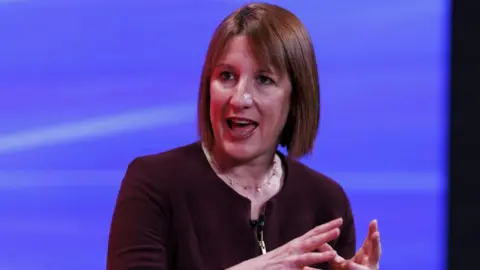 Getty Images
Getty ImagesThe government has promised not to raise taxes on “working people” in this Wednesday’s Budget.
However, with the big day looming, it still isn’t clear exactly what this means, who Chancellor Rachel Reeves will protect, or who will get a Halloween shock.
So what have Labour ministers defined as a working person?
‘Someone who earns a living’
The UK’s working people “know exactly who they are,” according to Sir Keir on Monday, who pledged to “protect their payslips”.
Last week, he went into more detail, defining it as someone who “goes out and earns their living, usually paid in a sort of monthly cheque” and who can’t “write a cheque to get out of difficulties.”
He was asked last week whether those who work – but get additional income from assets such as shares or property – would count as working people.
They “wouldn’t come within my definition” he said.
Speaking afterwards, Sir Keir’s spokesman clarified that those with a “small amount of savings” could still be defined as working people.
This could include cash savings, or stocks and shares in a tax-free Individual Savings Accounts (ISA), he suggested.
‘Strivers who graft’
 Getty Images
Getty ImagesRachel Reeves had a different definition. Working people are “strivers who graft”, according to the chancellor.
She wrote in the Sun on Sunday that her Budget was for “hardworking families up and down the country who have been crying out for change”.
“To these people I say, I’ve got your back. This is your Budget. I will deliver for you. It’s a Budget for the strivers.”
She has said a decision to raise National Insurance (NI) contributions paid by employers does not break Labour’s pledge for protecting “working people”, even if the business is a small one.
Although, arguably, a hike in employers contributions could still fall on working people.
Paul Johnson, the director of the Institute for Fiscal Studies think tank, has said if the government did increase NI paid by employers it would be a “straightforward breach” of their manifesto commitment, on the grounds that the manifesto did not explicitly distinguish between employer and employee NI.
‘People who go out to work’
“Working people are people who go out to work for their income,” Treasury Minister James Murray told the BBC’s Nick Robinson on BBC Radio 4’s Today programme.
Asked repeatedly if he would count landlords among that group, or if those with shares count as working people, Murray said: “I’m not going to get into too many hypotheticals here, Nick.”
“We’re talking about where people get their income from,” he said, adding ministers wanted to protect people who “get their income from work”.
‘People who run businesses?’
Education Secretary Bridget Phillipson was asked: “Why are people who run businesses not working people?”
She avoided saying if she thought business owners could be considered working people.
She told the BBC’s Sunday with Laura Kuenssberg that “working people” were those whose main source of income came from “going out to work”.
Phillipson added that “working people will not see higher taxes in the wage slips that they receive” following the Budget.
‘Not about this job or that job’
Quizzed by Sky News on whether or not landlords count as working people, senior minister Pat McFadden said: “I don’t think it’s about definitions of this job, that job, some income level where if you earn a pound more than that you’re not a working person”.
He also avoided answering whether or not business owners or landlords counted as working people.
Talking to the BBC, he said: “When we talk about people, we refer to the promises that we made in the manifesto around the taxes and wages that people pay. They won’t go up when the chancellor gets to her feet on Wednesday”.
He added that “working people” isn’t a “definition of wages”.
In the end, whatever the definition of working people, former Bank of England governor Mervyn King says the impact of a big tax increase will be the same.
If firms face higher taxes then they will be less likely to create new jobs and increase wages as a result, he suggested.
“Ultimately, they fall on the amount that people can spend, and you only can raise significant amounts of money by raising taxes on most people, however you care to define that, but most people will have to pay higher taxes,” he told Sky News.


